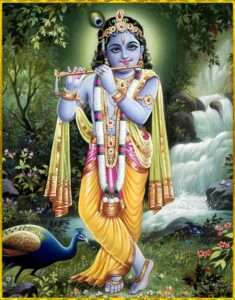The cultivation of chanting the holy names in a favorable mood in the company of pure devotees to the level of attachment is described in Srimad Bhagavatam (11.3.30 / 31) as follows:
parasparanukathanam
pavanam bhagavad-yasah
mitho ratir mithas tustir
nivrttir mitha atmanah
smarantah smarayantas ca
mitho ‘ghaugha-haram harim
bhaktya sanjataya bhaktya
bibhraty utpulakam tanum
One must learn how to associate with devotees of the Lord by being with them to sing the glories of the Lord. This method is the most purifying. As devotees develop a loving friendship with each other, they experience mutual happiness and satisfaction. By encouraging each other, they are able to let go of sense gratification, which is the cause of all suffering.
Devotees of the Lord continually talk to each other about the glories of God’s Personality. Thus, they constantly remember the Lord, reminding each other of His qualities and pastimes. With devotion to the principles of Bhakti-yoga, devotees satisfy the Personality of God, which frees them from all bad omen. Having purified themselves of all obstacles, they feel pure love for the Supreme Lord awakening, and therefore, even though they still live within this world, their spiritualized bodies exhibit the symptoms of transcendental ecstasy, including the rising of hair on the body.”
Sometimes pure devotees, free from pride, roam the whole world chanting and preaching love for the holy names of the Lord. As Narada Muni states in Srimad Bhagavatam (1.6.26):
namany anantasya hata-trapah pathan
guhyani bhadrani krtani ca smaran
gam paryatams tusta-mana gata-sprhah
kalam pratiksan vimado vimatsarah
Free from any material obligation, I began to chant the holy names and glories of the infinite Lord. So absorbed in chanting and remembering the transcendental pastimes of the Lord, the source of all blessings, I traveled all over the earth, fully satisfied and free from pride and envy.
Again from Srimad Bhagavatam (11.3.32):
kvacid rudanty acyuta-cintaya kvacid
dhasanti nandanti vadanty alaukikah
nrtyanti gayanti anusilayanti ajam
bhavanti tusnim param etya nirvrtah
Having achieved love for God, devotees sometimes cry loudly, absorbed in the thoughts of the infallible Lord. Sometimes they laugh, feel great pleasure, speak aloud to the Lord, dance or sing. Such devotees, having transcended conditioned life, sometimes imitate the unborn Supreme by enacting His pastimes. Sometimes hearing His voice, they remain peaceful and silent.
Attachment to seeing the beautiful form of divinity is described in these words from Srimad Bhagavatam (10.23.22):
syamam hiranya-paridhim vanamalya-barha-
dhatu-pravala-nata-vesam anuvratamse
vinyasta-hastam itarena dhunanam abjam
karnotpalalaka-kapola-mukhabja-hasam
His complexion was dark blue, and His clothing was gold. He wore a peacock feather, colored mineral powders, twigs of flower buds, and wreaths of forest flowers and leaves. He was dressed just like a theatrical dancer. He had one hand resting on a friend’s shoulder and with the other he was twirling a lotus flower. Lilies adorned His ears, His hair fell down His cheeks and His lotus face smiled.
Again from Srimad Bhagavatam (10 21.5):
barhapidam nata-vara-vapuh karnayoh karnikaram
bibhrad vasah kanaka-kapisam vaijayantim ca malam
randhran venor adhara-sudhayapurayan gopa-vrndair
vrndaranyam sva-pada-ramanam pravisad gita-kirtih
Carrying a peacock feather as an ornament on His head, karnikara flowers on His ears, wearing a bright yellow outfit like gold and a Vaijayanti garland, as He entered the forest of Vrndavana Sri Krishna exhibited his transcendental form as the best of dancers, embellishing it with the footprints of His feet. He filled the holes of His flute with the nectar of His lips, and the young shepherds sang His glories.
This is a section of the book “Bhajana Rahasya”, by Bhaktivinode Thakura.
To buy the complete book, click above
Post view 296 times




Leave a Reply